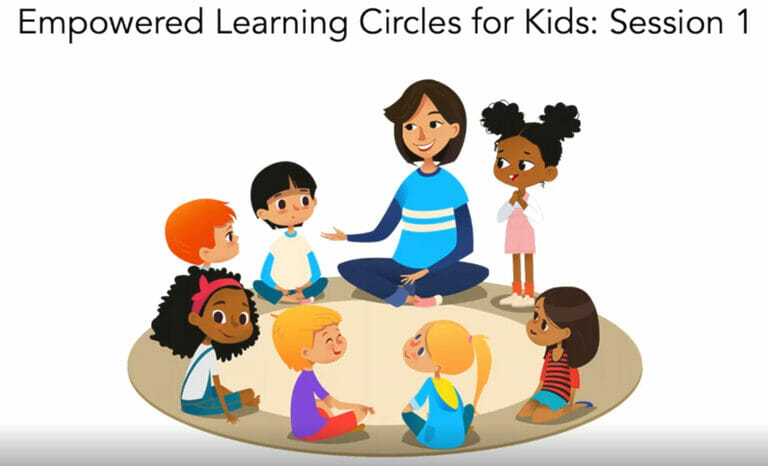Empowering youth in education
What is sociocracy in school governance, and why does it matter?
Imagine a school where every student has a voice in decisions that matter to them.
Democratic schools using sociocracy as school governance to include students and teachers in decisions school-wide exist all over the world.
Schools that include students in decision-making have experienced outcomes such as:
“[Working in] a sociocratic way helps to instill a school culture of trust and contributes to a calmer and more peaceful felt-sense in everyday school life.”
Ellen Even, staff member at Integrale Tagesschule Winterthur

“I’m so glad to have found sociocracy- which is democracy, as it could be- to help with the subtle art of compromise.”
Hope Wilder, Pathfinder Community School

Students problem-solving and decision-making
Consent decision-making, a way of deciding together where everyone is OK with the result, is a core part of sociocracy. This video shows a consent decision at a school using sociocracy in school governance about whether or not to rent a cotton candy (candyfloss) machine for a celebration. Watch how the students resolve objections and come up with a solution everyone can live with. From the film School Circles.
Download our free booklet
“Sociocracy with Kids”
What are the first, easiest steps to improve making decisions with children? This booklet will introduce you to:
- What to decide about
- Rounds
- Consent decision-making with kids
- Tips for easy and fun meetings with kids
Sign up to our mailing list and download this free booklet!
In addition, another booklet for adults called Sociocracy – a brief introduction is available as a free download for those who are signed up for our mailing list.


Let’s Decide Together! By Hope Wilder
Let’s Decide Together is an accessible workbook for anyone interested in practicing sociocracy with children ages 5-12. Adults can use it to make more values-aligned, egalitarian, and inclusive decisions together with children in the home, at school, clubs, neighborhood groups, or in any group where adults and children are empowered to decide together.
$20 paperback, $8 ebook
See our Resource Page for free downloadable agendas, cheat sheets, circle diagrams, and video resources for the book.
How does sociocracy in schools work?
Sociocratic school governance has many facets. View recordings from the Sociocracy in Schools conference from January 15, 2022 for free here.
Topics include:
- Nonviolent communication and sociocracy
- Case studies of sociocracy in schools
- Power and trauma in schools using sociocracy
- Sociocracy in under-resourced communities
- Sociocracy with youth organizations

Free Video Series: Empowered Learning Circles for Children
Do you have a group of children you’re ready to practice with? Watch this free 4-part series that will help you practice:
- Rounds
- Consent decision-making
- Collaborative proposal-forming
- Sociocratic selection process
- Feedback

List and map of schools using sociocracy
What schools are using sociocracy?
There are over 40 schools worldwide using sociocracy for school governance in the list below. There are likely many more classrooms and teachers using sociocracy than we know about.
Note: this list is FAR from complete! Email [email protected] to help us make it more complete. see map below from Wondering School for more information.
Click here to see the full list
Australia
Austria
- Freie Montessori Schule Freistein
- KreaMont, (watch presentation)
- Sport Mittelschule Schendingen(using sociocratic selections)
Chile
France
- Ecole Démocratique Ebroïcienne
- École Nouvelle de la Rize
- L’atelier des possibles
- La Croisee des Chemins (no longer in operation- watch presentation here, read case study here.)
- La Ferme des Enfants in Ardèche
Germany
- APEGO
- Aktive Schule Leipzig
- Freie Schule Lindau (using sociocratic selections)
- Frisch Schule, (watch presentation)
- PIEKS
Netherlands
- Basisschool makED – Make Education
- De Ontdekking
- De School
- De Vrije Ruimte
- Democratische School De Ruimte
- DOE – Democratisch Onderwijs Eindhoven
- Guus Kieft School
- Kenniscentrum Kosmos Gronigen
- LIFE
- LOS Sociocratische Leeromgeving (case study)
- Plan B Sociocratische School
- Stichting Vivere Democratisch Onderwijs
- VO De Vallei
- Zorgboerderij De Mieden
South Africa
Spain
Sweden
Switzerland
Thailand
United Kingdom
United States
- Agile Learning Center Mosaic, NC
- Austin Waldorf School, TX
- Desert Star School, AZ
- Hershey Montessori School, PA
- High Mowing School, NH (formerly using sociocracy, read case study, watch presentation)
- Montessori Children’s House, WA (watch presentation)
- Morey Flextech High School, MI (presentation)
- New Roots Charter School, NY
- Pacem School, VT
- Pathfinder Community School, NC (no longer in operation, presentation)
- Rainbow Community School, NC (watch presentation, read academic peer-reviewed study)
- River Farm Forest School, VA
The Sociocracy in Schools Map shows many schools that practice sociocracy around the world. This resource is part of a research project by Wondering School with collaboration of many organizations and individuals who care about sociocracy. If you would like to collaborate with the map, please get in touch via email: [email protected].

“Lectica has tested many other private schools – very good ones – and also public schools of high socio-economic level, but we have never seen scores like Rainbow. […] Rainbow students have remarkable ‘perspectival’ abilities to take the perspective of others, a core aspect of transformative learning.” Source article
Dr. Theo Dawson













